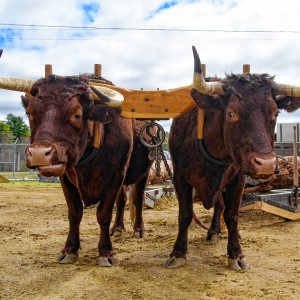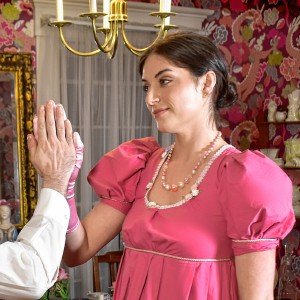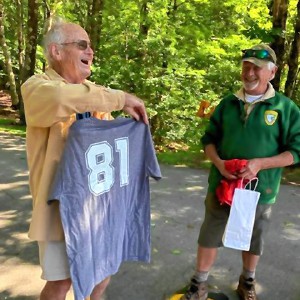DNA testing for cattle
| Published: 01-18-2019 5:26 PM |
When calves are born at Miles Smith Farm in March and April, it’s obvious who their moms are. They’ll be nursing, protecting and generally fussing over them. But, as sometimes occurs among humans, identifying the father can be harder.
Thank goodness we live in the 21st century when DNA testing is cheap and easy. Yes, DNA testing for cattle is a thing.
We farmers like to micro-manage the sex lives of our cattle. To prevent male calves from impregnating a cow, most of them are castrated. These steers can then share a pasture with the cows without worry of unplanned pregnancies.
Occasionally, a bull calf is distinctive. Maybe his sweet nature and his exemplary physique make him a good prospect for breeding. In that rare case, he won’t be castrated and will be able to be a father. But I’ll try to sell or trade him because he’ll have too many relatives here, and inbreeding is not good for the quality of the herd.
Usually, he’s gone to another owner before his libido acts up. But if not we’ll pasture him with steers or other bulls in a monastic “boys only” situation.
For robust and healthy breeding, I import talent from another herd. Our white Scottish Highlander bull was purchased from Purling Beck Farm in East Washington, N.H. And while we live far from the nation’s capital, we named him Washington, an appropriate name for a bull who lives on Whitehouse Road. Our two other bulls are Larry, who is the lovemate for my Angus-cross cows, and a silver Highlander bull named Smokey. Both Larry and Smokey are currently “on assignment” at neighboring farms.
Breeding season on our farm is from mid-July to Aug. 31. One bull can service a herd of 20 to 25 cows. Add more cows, and another bull is needed. To be sure that all my 30-plus cows become pregnant, I will sometimes put two bulls in the pasture.
Whenever a calf is born, I count backward nine months and check my records to figure out which bull was with the mother at conception. If two bulls shared the pasture, it takes a DNA test to sort out the paternity. We don’t care about the parentage of steers, but for heifers or potential bull studs, we need the $40 test.
Article continues after...
Yesterday's Most Read Articles
 No deal. Laconia buyer misses deadline, state is out $21.5 million.
No deal. Laconia buyer misses deadline, state is out $21.5 million.
 “It’s beautiful” – Eight people experiencing homelessness to move into Pleasant Street apartments
“It’s beautiful” – Eight people experiencing homelessness to move into Pleasant Street apartments
 With Concord down to one movie theater, is there a future to cinema-going?
With Concord down to one movie theater, is there a future to cinema-going?
 Quickly extinguished fire leaves Concord man in critical condition
Quickly extinguished fire leaves Concord man in critical condition
 Concord police ask for help in identifying person of interest in incidents of cars being keyed during Republican Party event
Concord police ask for help in identifying person of interest in incidents of cars being keyed during Republican Party event
The test is simple and requires pulling a few hairs, root and all, from the tail of the calf. We then tape the sample to a form, fold the form, and send it to a lab in California. The American Highland Cattle Association registry compares the lab results to its database, and the father is identified.
If the calf is a potential breeding bull, DNA tests are also required on both parents. The AHCA wants to certify the parentage of all breeding bulls to keep owners honest about lineage.
Once in a while, we have an unplanned pregnancy. Last summer a young bull snuck into a pasture with some heifers. He was only there a day or so, but it doesn’t take long to father a calf or two. I recorded the dates of his intrusion, so later on, I can reconcile them with the birth dates. If he might be the father, a DNA test is necessary.
DNA testing is all the rage today and can be used to analyze human ancestry. Results might determine if you are Irish or Italian or any combination of nationalities. Human DNA testing can also indicate if you are related to a famous person, like Grover Cleveland or even Albert Einstein. My Highlanders don’t need a test to resolve if they are Scottish, but I wonder if one of my heifers might be related to someone famous or maybe have distant Irish or Italian cousins?
(Carole Soule is co-owner of Miles Smith Farm, where she raises and sells beef, pork, lamb, eggs and other local products. She can be reached at cas@milessmithfarm.com.)


 Celebrate agriculture, education, and community at the NH Farm, Forest, and Garden Expo
Celebrate agriculture, education, and community at the NH Farm, Forest, and Garden Expo Community Players of Concord present newest adaptation of Pride and Prejudice
Community Players of Concord present newest adaptation of Pride and Prejudice Concord Monitor editor Mike Pride’s final book explores the lives, works of Northern New England poets
Concord Monitor editor Mike Pride’s final book explores the lives, works of Northern New England poets Active Aging: John Burke of Peterborough celebrated his 81st birthday with 81 hikes up Pack Monadnock
Active Aging: John Burke of Peterborough celebrated his 81st birthday with 81 hikes up Pack Monadnock
